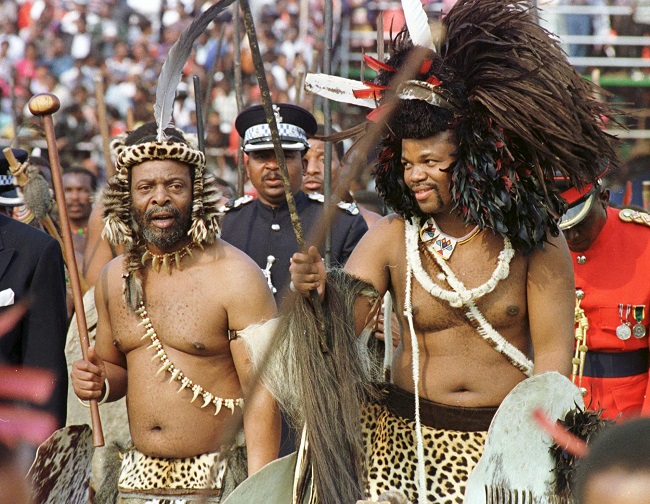South Africa’s Largest Ethnic Group, Zulus Await New King

![]()
South Africa’s largest ethnic group, the Zulus, will bid farewell on Thursday to their king, Goodwill Zwelithini, who for half a century was their charismatic but also controversial figurehead.
The longest-serving king in Zulu history, the monarch died on Friday after 50 years on the throne.
Under Zulu funeral rites, he should be interred by a few select men — an event the palace calls a “planting” of his remains rather than a burial.
The Zulus are popularly known for their vibrant culture, especially the timeless and riveting ancient war dance performed by the rhythmic stomping of feet.
The late king exuded the image of a traditional chief, typically sporting a poncho-like leopard-skin chest cover and wielding an unquestionable spiritual authority.
He spoke to powerful political leaders, and appeared in public with Nelson Mandela.
He also had visits from President Cyril Ramaphosa and ex-president Jacob Zuma, during which they were seen performing the gripping Zulu war dance, known as “umzansi.”
Even though he lacked executive power under the South African system, he still had moral clout over more than 11 million Zulus, nearly a fifth of the country’s population.
At the fall of apartheid, traditional leaders were constitutionally recognised and they continue to play an important symbolic and spiritual role.
They advise legislators and have a say in cultural, land management and justice administration in their territories. The Zulu king remains the most influential of all these traditional leaders.
‘Intricate’ succession choice
For now, secrecy shrouds the identity of Zwelithini’s successor, although the question is on everybody’s lips.
Ordinarily, it would have been the eldest son born to the senior of his six wives, with whom he sired 28 children.
But his first son, Prince Lethukuthula Zulu, was killed aged 50 last November at his Johannesburg home.
It is a “complicating factor” that the man who would likely have been the “designated” king is already dead, said Somadoda Fikeni, a cultural heritage expert.
Historian and cultural analyst Ntuli Pikita said that while the palace will have resorted to a “very intricate way” of picking the successor, its inner circle should know already who the next king will be.
– ‘Useful idiot’ –
Enjoying legitimacy as a descendant of famous and defiant kings who inflicted one of the British Empire’s worst defeats in the 1879 Anglo-Zulu war, Zwelithini was also divisive.
Following his death, a local newspaper described him as the “custodian of Zulu culture” but also as a “useful idiot in the hands of the apartheid government”.
During the twilight of the white minority regime in the 1990s, the Zulu nation, through the nationalist Inkatha Freedom Party, was accused of playing into the hands of the apartheid system’s fight against Mandela’s African National Congress (ANC).
The deadly inter-party conflict, said to have been aimed at destabilising the ANC and the inevitable arrival of democracy, claimed hundreds of lives.
Having survived colonialism and apartheid, the Zulu nation embraced democracy, and the newly formed “rainbow nation” of South Africa secured a guarantee of stability.
Nationwide, the state pays several hundred traditional chiefs, including a dozen kings and queens.
They ensure that customs are respected, reflecting the complexity of South African society where less than a tenth of the population speak English as their mother tongue.


